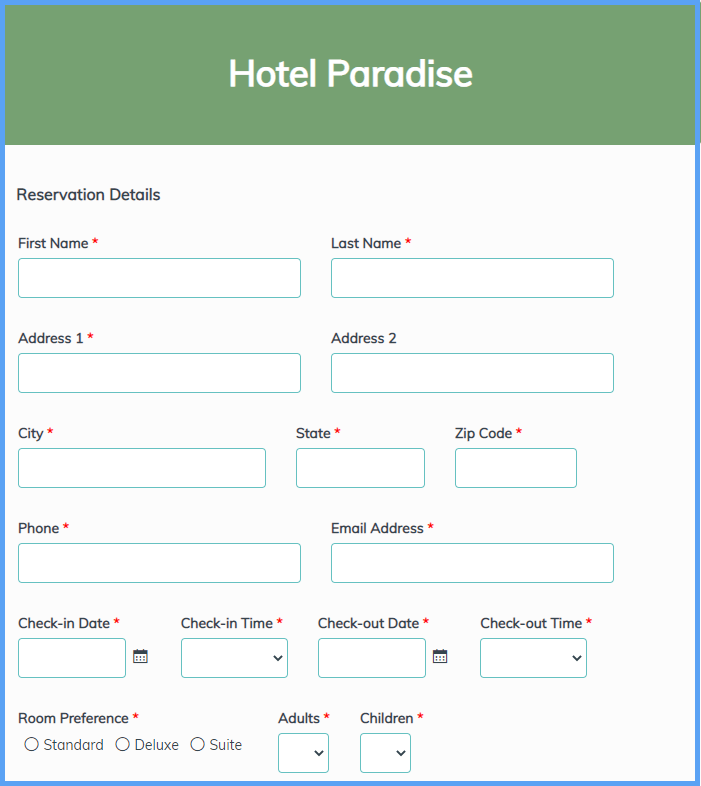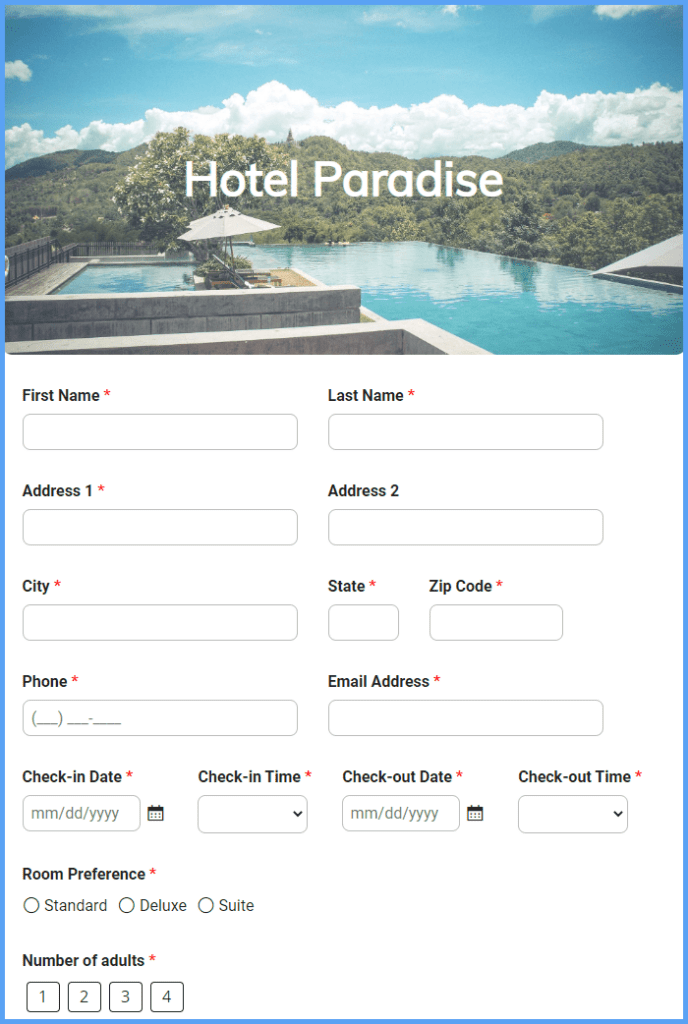In today's fast-paced world, the term "short form for reservation" has become increasingly important in the hospitality and travel industries. Businesses and customers alike are looking for quick, efficient ways to make bookings. Whether you're a traveler seeking accommodation or a business owner managing reservations, understanding the short form for reservation can significantly enhance your experience. This article will delve into the importance of short forms, how they work, and their impact on modern-day transactions.
As technology evolves, so do the methods we use to book services. The short form for reservation plays a crucial role in simplifying processes, saving time, and ensuring accuracy. By adopting these forms, businesses can streamline their operations, while customers benefit from faster and more convenient booking experiences.
Whether you're booking a hotel room, a flight, or a restaurant table, using the appropriate short form can make all the difference. In this comprehensive guide, we'll explore everything you need to know about short forms for reservations, including their definitions, types, and best practices. Let's dive in!
Read also:Afton Family Sex
What Does Short Form for Reservation Mean?
The short form for reservation refers to a simplified method or format used to book services or accommodations. Instead of filling out lengthy forms, customers can use concise formats that focus on essential details such as name, contact information, and booking preferences. This approach not only speeds up the booking process but also reduces the likelihood of errors.
Why Use Short Forms for Reservations?
- Enhances customer experience by simplifying the booking process.
- Reduces the time required for booking, making it more convenient for users.
- Improves accuracy by minimizing manual input errors.
- Facilitates easier management for businesses, allowing them to handle more bookings efficiently.
Common Short Forms for Reservation in the Industry
Various industries utilize different short forms for reservation depending on their specific needs. Below are some examples:
Hotel Reservations
In the hospitality sector, the short form for reservation typically includes details such as:
- Guest name
- Check-in and check-out dates
- Room type preference
- Contact information
These forms are designed to capture only the necessary information, ensuring a seamless booking experience for both the guest and the hotel staff.
Flight Bookings
For airlines, the short form for reservation often focuses on:
- Passenger details
- Travel dates
- Flight preferences
- Payment information
By using these streamlined forms, airlines can process bookings quickly, improving customer satisfaction and operational efficiency.
Read also:Anakhalifaaa Leaks Unveiling The Truth Behind The Controversy
Benefits of Using Short Forms for Reservations
Implementing short forms for reservation offers numerous advantages for both businesses and customers. Here are some key benefits:
- Time Efficiency: Short forms reduce the time needed to complete a booking, making the process faster and more convenient.
- Improved Accuracy: By focusing on essential details, short forms minimize the risk of errors, ensuring accurate bookings.
- Enhanced Customer Experience: A streamlined booking process leads to higher customer satisfaction and loyalty.
- Operational Efficiency: Businesses can handle more bookings in less time, boosting productivity and profitability.
How to Create an Effective Short Form for Reservation
Designing an effective short form for reservation involves several key steps:
Identify Essential Information
Begin by determining the critical details required for a successful booking. This might include:
- Customer name
- Contact information
- Booking dates
- Service preferences
Choose the Right Format
Select a format that is user-friendly and easy to navigate. Consider using online forms or mobile applications to enhance accessibility.
Test and Refine
Before implementing the form, test it with a small group of users to identify potential issues. Gather feedback and make necessary adjustments to improve functionality and usability.
Best Practices for Short Form Reservations
To ensure your short form for reservation is effective, follow these best practices:
- Keep It Simple: Focus on essential information only, avoiding unnecessary fields.
- Make It Mobile-Friendly: Ensure the form is accessible and easy to use on mobile devices.
- Provide Clear Instructions: Include concise instructions to guide users through the booking process.
- Secure Data: Implement robust security measures to protect sensitive customer information.
Impact of Short Forms on Customer Experience
The use of short forms for reservation can significantly enhance customer experience by:
- Reducing frustration caused by lengthy booking processes.
- Improving accuracy, which leads to fewer booking-related issues.
- Providing a seamless and efficient booking experience.
By prioritizing simplicity and efficiency, businesses can build stronger relationships with their customers, fostering trust and loyalty.
Challenges and Solutions in Implementing Short Forms
While short forms for reservation offer many benefits, there are challenges to consider:
Challenge: Balancing Simplicity with Completeness
It can be difficult to create a form that is both simple and comprehensive enough to capture all necessary details. To address this, focus on the most critical information and use follow-up communications to gather additional details if needed.
Solution: Use Technology
Leverage technology such as artificial intelligence and automation to streamline the booking process further. For example, pre-fill forms with customer data based on previous interactions to reduce the need for manual input.
Future Trends in Short Form Reservations
As technology continues to evolve, the future of short forms for reservation looks promising. Some emerging trends include:
- AI-Powered Forms: Utilizing artificial intelligence to personalize and streamline booking processes.
- Voice-Activated Reservations: Enabling customers to make bookings using voice commands, enhancing convenience.
- Blockchain for Security: Implementing blockchain technology to ensure secure and transparent transactions.
Conclusion
In conclusion, the short form for reservation plays a vital role in modern-day booking processes. By simplifying and streamlining bookings, businesses can improve customer experience, increase efficiency, and enhance operational effectiveness. Whether you're a traveler or a business owner, understanding and implementing short forms for reservation can make a significant difference in your booking experience.
We encourage you to explore the various short forms available and adopt the ones that best suit your needs. Don't forget to leave a comment or share this article if you found it helpful. For more insights and tips on reservations and bookings, check out our other articles on the website.
Table of Contents
- What Does Short Form for Reservation Mean?
- Common Short Forms for Reservation in the Industry
- Benefits of Using Short Forms for Reservations
- How to Create an Effective Short Form for Reservation
- Best Practices for Short Form Reservations
- Impact of Short Forms on Customer Experience
- Challenges and Solutions in Implementing Short Forms
- Future Trends in Short Form Reservations
- Conclusion


